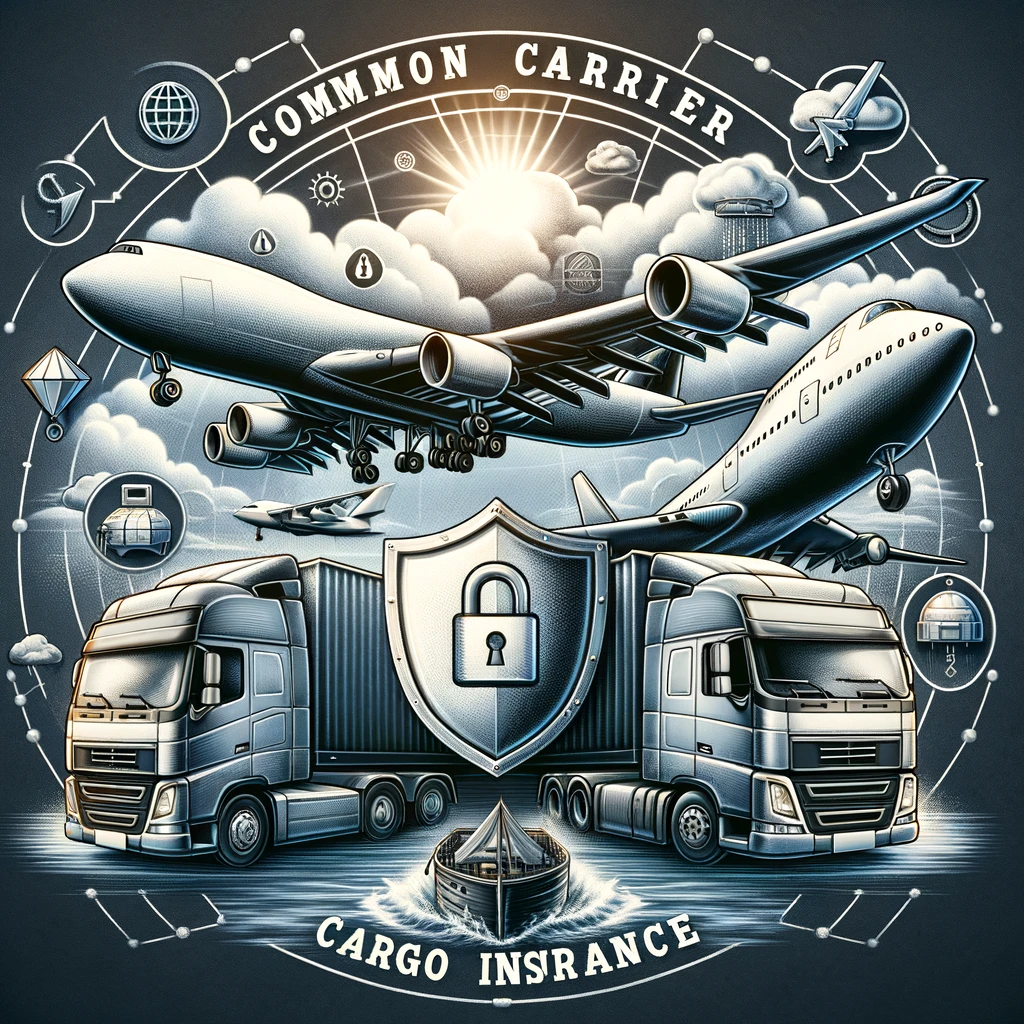Explaining Common Carrier Cargo Insurance Coverage: A Comprehensive Guide

Key Takeaways:
- Common carrier cargo insurance protects shipped goods against loss or damage
- Coverage typically includes protection against theft, damage, and loss during transit
- There are limitations and exclusions to standard common carrier cargo insurance
- Shippers may need additional insurance for full protection of high-value or specialized items
What is Common Carrier Cargo Insurance?
Common carrier cargo insurance is a type of coverage that protects goods being transported by a common carrier. A common carrier is a business that transports people, goods, or services and is available to the general public. Examples include trucking companies, airlines, railway companies, and shipping lines.
This insurance is designed to provide financial protection against various risks associated with shipping goods, including:
- Damage to goods during transit
- Loss of goods
- Theft of goods
- Delays that result in financial loss
Standard Coverage in Common Carrier Cargo Insurance
Typical common carrier cargo insurance policies cover the following:
- Physical Loss or Damage: This includes protection against damage from accidents, rough handling, or environmental factors during transit.
- Theft: Coverage for goods stolen while in the carrier’s possession.
- Fire and Explosion: Protection against losses due to fire or explosions during transportation.
- Natural Disasters: Coverage for damage caused by events like hurricanes, earthquakes, or floods.
- Collision: Protection in case of vehicular accidents involving the carrier.
- Overturning of the Conveyance: Coverage for damage resulting from a truck rollover or a ship capsizing.
Limitations and Exclusions
While common carrier cargo insurance provides substantial protection, it’s important to understand its limitations:
- Declared Value Limits: Most carriers limit their liability to a specific dollar amount per pound of cargo.
- Exclusions: Certain items may be excluded from coverage, such as:
- Hazardous materials
- Live animals
- Perishable goods
- Valuable items like jewelry or artwork
- Acts of War or Terrorism: Many policies exclude damage or loss due to these events.
- Improper Packing: Damage resulting from inadequate packaging may not be covered.
- Inherent Vice: Damage due to the nature of the goods themselves (e.g., spoilage of perishables) is often excluded.
Additional Coverage Options
Given the limitations of standard common carrier cargo insurance, shippers often consider additional coverage:
- All-Risk Coverage: This comprehensive policy covers all risks of physical loss or damage from any external cause.
- Named Perils Coverage: This covers only specific risks listed in the policy.
- Contingent Cargo Insurance: This protects the shipper when the carrier’s insurance is insufficient or doesn’t apply.
- Excess Value Coverage: This extends coverage beyond the carrier’s standard liability limits.

How Common Carrier Cargo Insurance Works
- Policy Purchase: The shipper or consignee purchases insurance coverage.
- Documentation: The insured value and details of the shipment are documented.
- Premium Payment: The insured pays a premium based on factors like value, destination, and type of goods.
- Claim Process: In case of loss or damage:
- The incident is reported to the carrier and insurer
- An investigation is conducted
- If the claim is valid, the insurer compensates the policyholder
Factors Affecting Common Carrier Cargo Insurance Rates
Several factors influence the cost of cargo insurance:
- Value of Goods: Higher value shipments typically require higher premiums.
- Type of Goods: Fragile or high-risk items may cost more to insure.
- Shipping Route: Longer or riskier routes may increase premiums.
- Mode of Transport: Different modes (air, sea, road) have different risk profiles.
- Packaging: Better packaging may lower insurance costs.
- Claims History: A history of frequent claims may increase rates.

Best Practices for Shippers
To make the most of common carrier cargo insurance:
- Understand Your Coverage: Thoroughly review policy documents to understand what is and isn’t covered.
- Accurately Declare Value: Ensure you declare the full value of your shipment to avoid underinsurance.
- Proper Packaging: Use appropriate packaging to reduce the risk of damage.
- Document Everything: Keep detailed records of your shipments, including photos if possible.
- Consider Additional Coverage: For high-value or specialized items, consider purchasing additional insurance.
- Choose Reliable Carriers: Work with reputable carriers with good safety records.
- Understand Claim Procedures: Familiarize yourself with the process for filing claims before you need to use it.
Common Misconceptions About Common Carrier Cargo Insurance
- “The carrier is always responsible for loss or damage”: Carriers have limited liability, which may not cover the full value of your goods.
- “All risks are covered”: Standard policies have exclusions and limitations.
- “Insurance is too expensive”: The cost of insurance is often minimal compared to the potential loss.
- “My company’s general liability policy covers shipping”: General liability typically doesn’t cover goods in transit.
- “I don’t need insurance for domestic shipments”: Losses can occur regardless of the shipping distance.

The Future of Common Carrier Cargo Insurance
The landscape of common carrier cargo insurance is evolving:
- Technology Integration: Use of IoT devices for real-time monitoring and more accurate risk assessment.
- Customized Policies: Increasing availability of tailored insurance solutions for specific industries or shipment types.
- Blockchain in Insurance: Potential for using blockchain to streamline claims processes and reduce fraud.
- Climate Change Considerations: Growing focus on insuring against extreme weather events.
- Cybersecurity Coverage: Emerging options for protecting against cyber risks in shipping and logistics.

Conclusion
Understanding common carrier cargo insurance coverage is crucial for anyone involved in shipping goods. While it provides essential protection against many risks associated with transporting cargo, it’s important to be aware of its limitations and consider additional coverage when necessary. By thoroughly understanding your insurance options and implementing best practices, you can ensure that your shipments are adequately protected, giving you peace of mind in your shipping operations.
Remember, the specific details of common carrier cargo insurance can vary between providers and policies. Always consult with insurance professionals and carefully review policy documents to ensure you have the coverage that best suits your needs. With the right insurance in place, you can confidently ship your goods, knowing you’re protected against the uncertainties of transportation.
